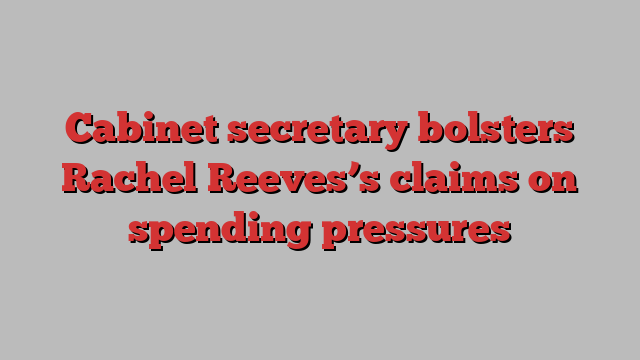
Unlock the Editor’s Digest for free
Roula Khalaf, Editor of the FT, selects her favourite stories in this weekly newsletter.
Britain’s top civil servant has bolstered claims by chancellor Rachel Reeves that she will be forced to make “painful” Budget decisions next month because of the allegedly chaotic state of the UK’s public finances.
Cabinet secretary Simon Case, in a letter to shadow chancellor Jeremy Hunt, suggested that the previous Conservative government contributed to recent spending pressures by failing to update departmental budgets, which were set in a 2021 spending review.
Case said “the sizeable in year changes to spending plans in recent years have resulted from the lack of a new spending review to replan departmental budgets in the face of significant pressures that have materialised since budgets were set in 2021”.
Reeves claimed in July to have discovered a £22bn “black hole” in the public finances this year, as departments struggled with the effects of higher inflation and new spending commitments.
She used the apparent discovery of the £22bn hole to explain a series of “incredibly tough choices” that she announced at the same time. These included axing winter fuel payments to 10mn better-off pensioners, scrapping road and rail schemes, reviewing a hospital building programme and the prospect of tax rises and welfare cuts to come.
Case appeared to endorse Reeves’s approach in a private letter to Hunt, first reported by the BBC. “Unlike previous years this government has set out to parliament the pressures it is having to manage down and the actions it is taking to do so,” he said.
Hunt has said he did not conduct a new spending review to cover departmental spending after April 2025 because of the timing of the general election in July, leaving his successor to carry out the work.
However Hunt strongly denied that he had left behind a £22bn black hole, pointing out that much of it was created by Reeves’s £9.4bn decision to approve independent recommendations for above-inflation pay rises for public sector workers.
He noted in a letter to Case that MPs formally approved spending plans presented to parliament — and signed off by senior civil servants — on July 17, days before Reeves claimed on July 29 to have found the fiscal hole.
Hunt told the Financial Times: “The real story behind this letter is that far from endorsing the government’s spurious £22bn quote it makes no mention of it whatsoever and defends the civil servants who told parliament it did not exist.”
When he was chancellor, Rishi Sunak’s spending review 2021 set departmental budgets up to 2024-25. But those plans were founded on an assumption of far lower inflation than actually transpired.
The Office for Budget Responsibility’s forecast in October 2021 estimated CPI inflation peaking at 4.4 per cent the following year. In fact, inflation peaked at 11 per cent, placing enormous strain on departmental budgets as costs rose and demands for higher public sector pay settlements intensified.
Further strain stemmed from the so-called mini-Budget of 2022 under the shortlived premiership of Liz Truss, which forced her successor Sunak to pencil in a tough budgetary retrenchment.
Treasury data in July showed that since that multiyear spending review of 2021, actual spending had already been substantially higher than expected, with increases to forecasts of £16.9bn in 2022-23, for example, and £23bn in 2023-24.
The Cabinet Office said it did not comment on leaks, but added that Case’s letter was a factual reply to questions raised by Hunt in his letter to the cabinet secretary in July.
Hunt wrote to Case in July: “If the estimates are wrong, will accounting officers be sanctioned for signing off departmental spending plans for this year which are based on a forecast of requirements that are wrong?”
Reeves said an explanation was contained in the footnotes of the new Treasury audit, which said the spending estimates given to MPs this month were prepared before the general election.
“The government was forced to lay them unchanged in order to allow them to be voted on before the summer recess,” the note said. “This was necessary to avoid departments experiencing cash shortages over the summer.”